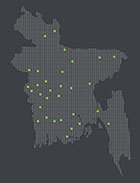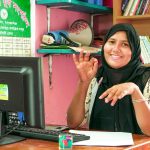Right to Food Bangladesh, a vibrant network facilitated by WAVE Foundation, has hosted ‘Asia-Pacific Right to Food and Agrifood System Conference (APRAC)’ on 26-27 July 2023 following a hybrid mode at Nabab Nawab Ali Chowdhury Senate Bhaban, University of Dhaka, Dhaka, Bangladesh. The conference brought together more than 700 people of all backgrounds including activists, citizen representatives, social actors, policymakers, farmers, ethnic community members, media, and youth participants. International delegates from the Asia-Pacific countries including Nepal, India, Pakistan, Philippines, Australia joined the conference. The prime objective of these two-day long conference has been to shape existing agrifood systems and its governance to be more equitable, sustainable, climate-resilient and promote the right to adequate food for all.
The conference was unveiled with the welcome speech of Mr. Mohsin Ali, General Secretary, Right to Food Bangladesh and Executive Director, WAVE Foundation. He welcomed everyone and addressed the context behind APRAC 2023. The inauguration ceremony was presided over by the distinguished economist Dr. Qazi Koliquzzaman Ahmad, Chairman, Right to Food Bangladesh and Dhaka School of Economics. Dr. Shirin Sharmin Chaudhury, MP, Honorable Speaker, of Bangladesh National Parliament, was present as the Chief Guest and inaugurated the conference. Honorable Planning Minister, M. A. Mannan, MP joined as the special guest. Professor Dr. Md. Akhtaruzzaman, Vice Chancellor, University of Dhaka; Sanjeev Karn, Joint Secretary, Ministry of Agriculture and Livestock Development, Nepal; and Ramesh Singh, Country Director, CARE Bangladesh attended the ceremony as the Guests of Honor. The inaugural session was moderated by Network Coordinator, Kaniz Fatima.
The Chief Guest appraised the initiative as well as emphasized the importance of building a sustainable agrifood system. “From the initial days of independence, various initiatives were started with an emphasis on agriculture. As the trend continues, Bangladesh is a role model for food production today. ” She added. She aspired that this conference will pave the ways to ensure food security of Asia-Pacific countries including Bangladesh. Honorable Planning Minister, M. A. Mannan, MP, wished this conference great success in moving forward in realizing the right to food and nutrition as well as a sustainable agrifood system through their valuable speech. He also added, “Due to the diligent efforts of the farmers of the country and far-reaching policies taken by the state, overall food production has greatly increased, achieving food self-sufficiency in Bangladesh.” The chair of the ceremony Dr. Qazi Koliquzzaman Ahmad echoed the urgency of the food crisis saying, “Access to food for everyone is crucial as well, and producing sufficient food for everyone is equally important in this period”. Professor Dr. Md. Akhtaruzzaman, Vice Chancellor, University of Dhaka as a guest of honor mentioned that Sustainable Development Goal No. 2 talks about ensuring a zero-hunger world which validates the demand for the Right to Food. In his valuable speech Ramesh Singh said, “Ever since the famines that occurred in the countries of the Indian subcontinent during the period of decolonization by the British, the demand for food for all has been raised.” On the other hand another guest of Honor from Nepal, Mr. Sanjeev Karn said “While progress has been made in food security globally, we are still faced with many challenges.” However, in the past decade, the countries of this region including Bangladesh have progressed a lot in food production. In the welcome speech, Mohsin Ali emphasizes, “This conference is about the right to food and nutrition emphasizing a sustainable agricultural food system, which will eventually confront the hunger and climate change crisis. This will pave new ways for us to move forward.”
The first session after the inaugural ceremony was a plenary session on the first day of this conference which was devoted to the discussion on a special topic titled “Legal framework & Fundamental Concerns on Right to Food in Asia-Pacific Region”. Dr. Qazi Kholiquzzaman Ahmad attended as the Chair and Moderator of the session. The session had two keynote speakers, first presented by Professor Dr. M. M. Akash, Department of Economics, University of Dhaka, and following him Mr. Farooq Tariq, General Secretary, Rabita Committee, Pakistan presented his keynote paper. Mr. Balaram, Former Food Security Advisor to the Supreme Court of India, Right to Food India, Mr. Bidur Subedi, National Alliance for Human Rights & Social Justice, Nepal, and Ms. Atty. Joy Angelica Doctor, and Searice, Philippine were present as the panelists of the session.
Apart from that, eight different technical sessions took place in this two-day-long conference focusing on various issues. On the first day, there were five technical sessions on Small and marginal farmers’ rights in the Asia-Pacific region to promote Zero Hunger; The impact of climate vulnerabilities on the agrifood system and food security; Right to Food and Social Protection in South Asia –A Policy Mapping Study and Gap Analysis; Effect of Food System in Nutrition Security; Transforming agrifood system and its governance for realizing the Right to Food. In all these sessions, there were subject experts, development practitioners, activists, researchers, academicians and people from different strata joined. Among them, Dr. A Atiq Rahman, Executive Director, Bangladesh Centre for Advanced Studies (BCAS), Mr. Abdul Awal, Member, National Committee of RtF BD and Executive Director, NRDS, Seema Luitel, WHH Program Manager and Head of Advocacy, Jib Nath Sharma, Senior Manager, Sustainable Agriculture, Food Security & Resilient Livelihood, CARE Nepal, Pavel Partha, Director, BARCIK, Asif Mohammad Shahan, Associate Professor, Department of Development Studies, University of Dhaka and many more prestigious guests shared their speech in different sessions with their panelists and moderators. On the second day, the session ‘Digitalization of Agriculture from the Perspective of Small-Scale Food Producers’ took place moderated by Md. Amirul Islam, Asian Farmers’ Association for Sustainable Rural Development (AFA). Besides, Sonia Bashir Kabir, Founder & Managing Director, Venture, Dr. Mirella C Gavidia, Australian Food Sovereignty Alliance (AFSA), Sultan Ahmed Biswas, Convenor, Progotishil Krishok Songram Parishad Bangladesh, Irish P. Baguilat, Coordinator, Asian Farmers’ Association for Sustainable Rural Development (AFA) were present as the panelist of the session. Professor Dr. Ranjan Saha Partha, Dept. of Anthropology, Jahangirnagar University presented his paper as the keynote speaker. The speakers of the session emphasized on the Digitalization of agriculture from the perspective of small-scale food producers.
In the session titled ‘Participation of Youth and Women in Agriculture Value Chain’, jointly organized by CARE Bangladesh and WAVE Foundation. Nurun Nahar, Country Director, Heifer International Bangladesh led the session as the Chair and Moderator. Md. Humayun Kabir, PhD, Professor, Department of Horticulture, Sher-E-Bangla Agricultural University attended the session as a panelist. During the session Mizanur Rahman, PhD, Senior Team Leader, JANO Project, CARE Bangladesh briefly introduced the Joint Action for Nutrition Outcome (JANO) project of CARE Bangladesh and welcomed the session participants. Later, Mst. Rifatul Jannat Rinki, Student, at Gangachara Model School, Gangachara, Rangpur shared her experience as a representative of School Garden, Rangpur. After that, Razia Akther Mimi, Porimal Chandra Roy, students from Nilphamari, Aysha Akther, a School Volunteer from Rangpur, and Md. Abdul Akher Mia, Head teacher from Gangachara Model High School, Gangachara, Rangpur engaged in a panel discussion during the session. Nasefa Ali, Deputy Executive Director, WAVE Foundation attended the event as the keynote speaker. She pointed out, “The entire food process from the field to the table is part of the agricultural value chain. Youth has a key role in this. Currently, there are scopes and opportunities for youth to participate in the digitization of agriculture.”
The plenary session on the second day titled ‘Future trajectory of Agroecology in Agrifood System and its Governance’ brought a spotlight on the futuristic factors of building a sustainable agrifood system and the territorial governance of the agroecology. This plenary was Chair & Moderated by Ms. Nuzhat Jabin, Country Director, Christian Aid Bangladesh. Dr. Sikander Khan Tanveer, Senior Program Specialist (Crops), SAARC Agriculture Centre, Mr. Sanjeev Kumar Karn, Joint Secretary, Ministry of Agriculture and Livestock Development, Nepal, Mr. Abdul Hamid, PhD (USA), Chairman, Agrarian Research Foundation (ARF), Dhaka and Professor, Department of Agronomy, Bangabandhu Sheikh Mujibur Rahman Agriculture University, Mr. Sultan Ahmed Biswas, Convenor, Progotishil Krishok Songram Parishad Bangladesh were present as the panelists of the session. Mr. Shahanuare Shaid Shahin, Secretary General, Bangladesh Agriculture Journalist Forum, and Md. Shamsuzzaman, Emergency Coordinator, Christian Aid Bangladesh presented their keynote paper.
Being the second plenary and final session at the conference, this session brought a spotlight on the futuristic factors of building a sustainable agrifood system and the territorial governance of agroecology. The session ended with a recommendation on synchronized agri production with a sustainable approach.
The Closing Ceremony of Asia Pacific Right to Food and Agrifood System Conference (APRAC) was chaired and moderated by Ms. Farah Kabir, Country Director, ActionAid Bangladesh. The session was graced by Advocate Md. Qamrul Islam, MP, Chair, Standing Committee on Agriculture Ministry, and Government of the People’s Republic of Bangladesh as the chief guest.
A declaration was delivered by Mohsin Ali, General Secretary of RtF BD and Executive Director, WAVE Foundation. Mr. Md. Ayeen Uddin, MP, Member, Parliamentary Standing Committee on Food attended the event as the special guest. Mr. Md Ruhul Amin Talukder, Additional Secretary, Ministry of Finance; Dr. Kiran Rupakhetee, Joint Secretary, National Planning Commission, Nepal, and Ms. Sasmita Jena, State Representative, Welthungerhilfe India, were the Guests of Honor.
The conference declaration unanimously adopted by the participants at the closing session outlined the following demands:
- It’s crucial to support climate resilient and agroecological approaches and defend family farmers to protect the small and marginal farmers.
- Ensuring the legislation on the right to food for all in Bangladesh and other Asian and Pacific countries
- We want agricultural services and support (subsidy) that are justified to small and marginal farmers as well as for large farms.
- We demand that the state take the initiative to strengthen people-centered agrifood systems in order to create sustainable and equitable systems, rather than corporate-led agrifood systems.
- We call for ensuring the right to food and nutrition for the most marginalized members of society after analyzing the social protection program.
- We call for accessible, affordable community-based digital technology as well as a platform in place to scale up digitalization in agriculture.
- We call for robust monitoring and assessment procedures in social protection programs to enhance accountability and transparency in the provision of services and to provide service receivers with a clear path toward graduation
- To strengthen multi-stakeholders, we highly advise forming partnerships with smallholder family farmers, fishermen, CSOs, farmers’ organizations, youth, women, academia, researchers, and policymakers to raise the voices of smallholders and other stakeholders
- It is highly recommended to provide training to the small and marginal farmers on agro-ecological tools and techniques as well as digital literacy
- We call for a separate act and regulation for the farmers/producers organization as a vehicle of operating a system to assure their participation in all stages of the agriculture value chain and fair price of their products
Expressing solidarity with the demand of the conference, Advocate Kamrul Islam MP said, “The current government has made it possible to transform the country from a food deficit to a food surplus country. At present, we produce about 45.5 million metric tons of food, although the agricultural land has not increased a bit. All the agriculture institutions are supported by the government which has led to ensure food security but nutrition has not yet been ensured. The Food Safety Authority is working towards that. The social safety net created by the current government is unprecedented.”
Asia Pacific Right to Food & Agrifood System Conference 2023 was concluded by affirming the fulfillment of the objectives from everyone’s end.






